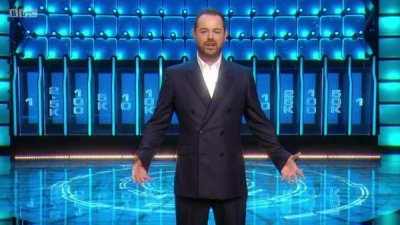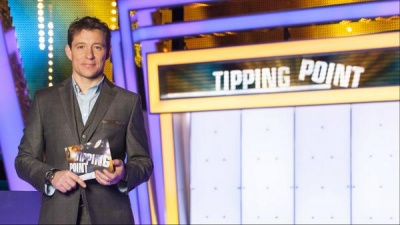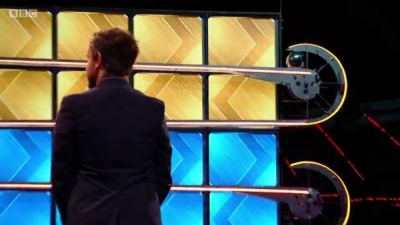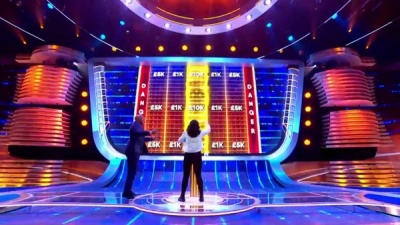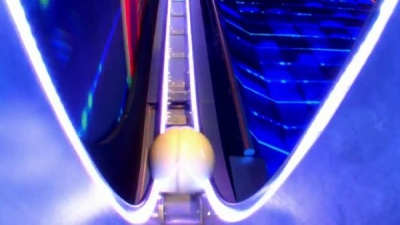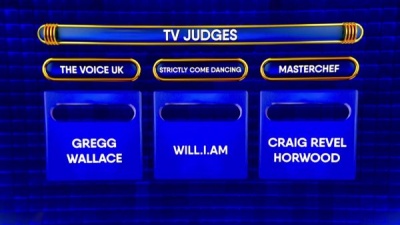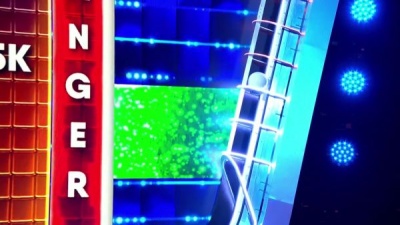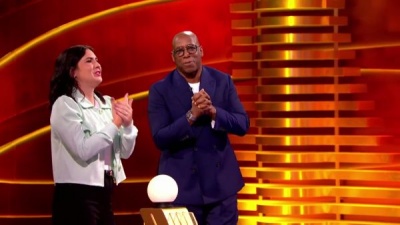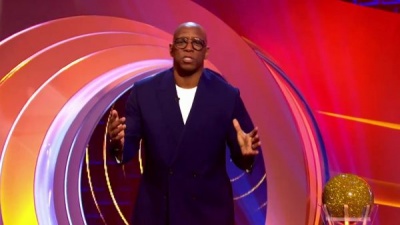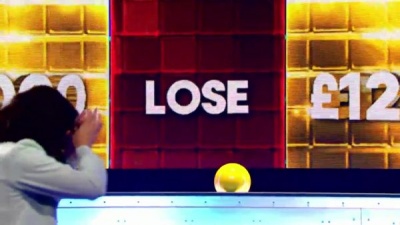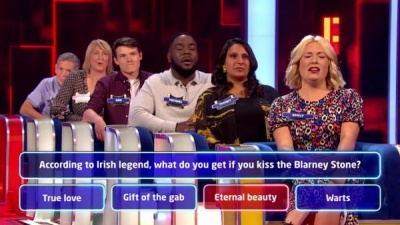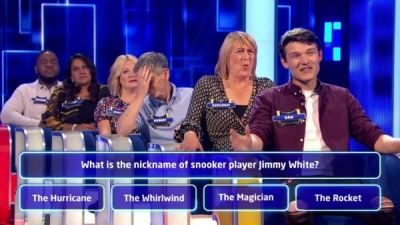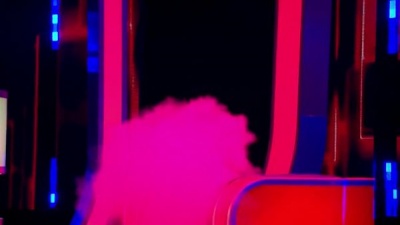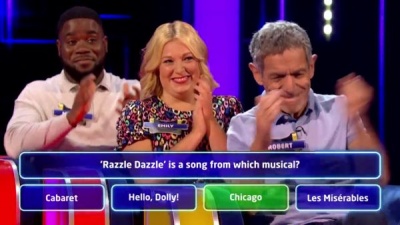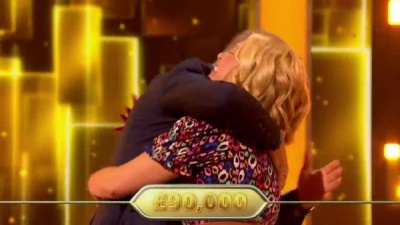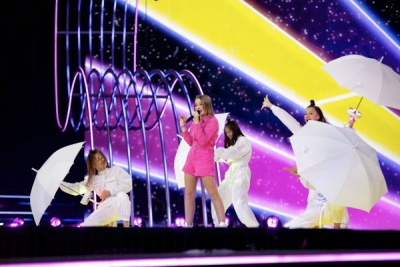Weaver's Week 2021-11-21
Last week | Weaver's Week Index | Next week
Why are Tipping Point and The Wall amongst the most compelling shows on television? Our lead review helps clarify our thoughts. We've also a look at Gary Lineker's new job, and the hosts for the Junior Eurovision next month.
Contents |
Moneyball
Possessed for ITV, from 30 October
We have a theory: when things move on television, they're best to move in exactly two dimensions.
Take, for instance, The Wall. Balls go in at the top, come to rest at the bottom. They will move from side to side as they fall, and could rebound up a little way. The balls are moving horizontally and vertically.
Or take Tipping Point, which is a more complex example. Counters go in at the top of the machine, and come to rest at the bottom. The counters, again, move side to side, and might rebound up. Horizontal and vertical movement again. But then another dimension comes into play: the shoves on the shelf, with forward and "lateral" movement. In this case, "lateral" is the same plane as "horizontal" when the counter was falling.
Then there's Rolling in It, where counters are thrown on their edge on a series of conveyor belts, roll around for a bit, and eventually land in one of a number of baskets. This part of the show has two dimensions, coins roll from side to side, and backwards and forwards. Clever game design and excellent hosting help elevate this show further.
It's not just game shows. Motor racing is all about cars moving forwards and to the side on a flat track. Skiing is primarily about people moving forwards and to the side while on the surface of a hill.
And this insight helps us to work out why some other shows were dull. The Edge, on BBC1 a few years ago, asked contestants to roll a ball along a lane, hoping not to fall off the end. The only way is forward, it's a one-dimensional show, and fell flat on its face. More recently, The Void tries to get from one side of a bridge to the other side. For all they dressed it up, The Void was just one-dimensional, and was an equal flop.
Three-dimensional television has been tried, but television isn't good at telling us what's near and far away. Moneyed people on the internet have tried to make drone racing a thing, but it's never worked. Airmageddon tried to show us drone racing in a big arena, but didn't give us enough visual information to make sense of what we were seeing.
Perhaps the most compelling example of one-dimensional telly is Hardball, a BBC daytime show from a few years ago. The fundamental idea was compelling: how long can you answer questions at a fast enough rate? The visual execution worked, but the rest of the programme was sterile and repetitive: in particular, it needed to be less of a monologue by host Ore Oduba.
The star of Hardball was a large silver ball, and it's buffed itself up and come back on Moneyball. Joining the ball is Ian Wright, host of Friends Like These and Wright Around the World. It's been twenty years since Ian was entrusted with a primetime game show, and this is a waste of a talent. Ian is confident, charming, knows the format, empathises with the contestant. He's the correct man for this job.
Sadly, as with Wright Around the World, the format of Moneyball lets it down. The basic idea is to roll a ball forwards and backwards along a track. Where it comes to rest is how much it's worth.
Now, what did we say earlier? Two dimensions good, one dimension dull. Moneyball is a one-dimensional game. The ball rolls forwards and backwards. While the track does go up at both ends, this is only to help slow the ball, it's not so that the ball can turn cartwheels or leap gaps. And the track is grooved on both sides, so that the ball cannot fly out laterally.
How does the game work? Our player answers a fairly simple general knowledge question, matching three items to three possible answers. One item per answer. Get the question right and the player earns a ball. (What happens if the player gets the question wrong? We don't know: in three episodes, it's not happened, which tells us either that the player is instantly removed from the game, or that it happens very rarely.)
So our player has a ball. They can control the initial height of the ball, but only indirectly. The player sees a rising column rise up the side, going faster as it nears the top, then it fades off and a new climb begins again at the bottom. Our player bangs their button to stop the climb, and the ball is elevated so that the bottom of the ball is at the line shown.
Then there's a countdown, 3 – 2 – 1, and the ball's released. We see it roll along the bottom, and part-way up the other side. We cut to a shot of Ian and the contestant, a device so that the producers can edit around how long the ball takes to come to rest – at some of the highest settings, it can be rolling for a couple of minutes.
Eventually, the ball will stop on the bottom rail. Above this bottom rail are various zones with sums of money, ranging from £1000 to the board maximum – in steps from £10,000 to £50,000 then a full £100,000. Whichever zone contains most of the ball when it stops, that's the prize the player will win. There are also "Danger" zones indicated on the board. We don't know what happens if a player hits one of those, as it's not happened in the first three episodes.
Our contestant has a choice. They can play on for the next board – and our player sees the board, gets tempted by what's on offer. Or they can stop and try to cash out. Cash out? It's one final roll, one final board, with about 60% of the board marked as a win, and 40% as a flat loss. All or nothing, hit or miss.
The player has one lifeline: if they're stuck on a question, they can use a "Question Ball". It works like any other ball on the show, raise it up to release it. Whichever answer it lands on is marked as right or wrong. Just one of these "Question Ball" opportunities in the game.
Although Moneyball offers a potential top prize of £250,000, most contestants are happy to cash out at £30,000 to £50,000 – that's one to two year's salary for the average worker.
There's a ghost of the show's working title, heard in one of Ian's regular phrases, "it's one shot to win the lot". Back when we first heard about Moneyball it was going to be titled The Money Shot, then they found a smutty meaning and changed the name. We've also heard that the recording was delayed from spring to autumn because the mechanical release didn't release the ball properly. (Specifically, something about a "malfunctioning cannon", which is intriguing.)
What's to like about Moneyball? The set is lit in a dark red, with orange accents and a neutral blue background: it looks very good on screen, as if it's gently burning in the background. The show gains from music by Paul Farrer: being a completist, he's scored each individual roll separately, and the programme gains from such attention to detail.
Each show contains three or four full games, lots of people have the chance to take home a very useful wodge of cash. This is a good thing – the format isn't stretched out too thinly. And it's a negative, showing just how little there is to Moneyball. Answer some simple questions. Stop a launcher, bank some money, and potentially win it. All of this appears to be more luck than judgement, and shows based on pure luck have never lasted long.
Ultimately, we've found Moneyball to be disappointing. It's pure luck, there's little-to-no skill involved. While they use their gimmick as much as possible, it's a tedious gimmick, just a forwards and a back. And there's no way we can anticipate the outcome and prepare ourselves for joy: Tipping Point has a moment when the counter might fall, Rolling in It has coins balanced between buckets, Moneyball just has a rolling ball.
Viewers have tended to agree that Moneyball isn't worth their time. 1.8 million viewers for the first two episodes puts it on a par with Channel 4's Handmade and BBC2's House of Games (3). And it's behind daytime Tipping Point, which isn't a good look for any primetime ITV show. Moneyball needs another series to sort out its problems, but we doubt it will get that opportunity.
Sitting on a Fortune
Possessed and Potato (divisions of ITV Studios) for ITV, from 7 November
Over at the sports desk, they have a test. Would this rule be clear if Gary Lineker explained it on Match of the Day? The audience for the BBC's football show is there to watch football, to cheer and boo, they're not interested in long rules expositions. And the audience might be drunk because it's 11pm on a Saturday night, or half-asleep because they're watching the repeat at 8am on a Sunday morning. Gary has to be clear and precise, and make some complex ideas appear simple.
Which brings us to Sitting on a Fortune. Gary Lineker is in a studio, with lots of empty seats by him. Soon enough, those chairs are going to be filled with contestants! People! Folk who could be sitting on the titular fortune! "They'll battle to be in the right place, at the right time" promises Gary, unwittingly channelling the spirit of Dale Winton.
In a few simple sentences, Gary explains the basics of the show. Whoever's in the golden front seat, the money chair, answers some general knowledge questions. A right answer keeps them in the running. A wrong answer sends them to the back of the line, and the next contestant will take their place. Whoever's in the money chair at the end of the show could win £100,000 (€120 000).
A group of seats is going to need a group of people to sit in them. Enter the contestants! Backstage, they've picked their order of luck, and each contestants chooses the seat they'll occupy. It's strictly one person per seat, obviously.
In the first round, the player who gives the third correct answer will go forward to the final. Not the first, not the second, but the third right answer. Whoever's at the back – whoever gave the last wrong answer – is out of the game entirely. The questions are all multiple choice, four possible answers only one of which is right. No lifelines, though one of the answers is usually there for comedy.
As the round progresses, Gary has a chat with the players as they reach the front seat. We viewers can see the reactions of the players behind the front seat, but the player in the money seat can't turn round and look at them.
The initial selection of seats is crucial: people tend to fill from the middle out, leaving the first and last seats to the end. There's a further twist, as the four remaining players in the second round choose their chairs in their finishing order from the last round – whoever was closest to the front gets first dibs.
Second round is almost exactly the same as the first: the third right answer takes someone to the final, and whoever's at the back is off the show. The questions are not terribly demanding, but the contestants on some episodes are very good at getting them wrong. By nature, you can't edit around bits of Sitting on a Fortune for time, they have to show every question and every error.
All these errors mean we get a lot of practice at seeing people go from the front of the line to the back. Everyone walks on their right, so the player retreating is closer to the camera, and walks past everyone moving forward.
They could have had actually moving chairs – as they had on Ejector Seat a decade ago – but they've decided not to make the chairs move. It's the right idea: that would be an extra gimmick, prone to failure and breaking down. Sitting on a Fortune might benefit from these gimmicks, but it doesn't need gimmicks, it's a very flexible format.
For the third round, Gary introduces a new rule. The player in the back chair picks one of two categories for the player in the money chair. It's the player in the money chair who will answer the question, and only two correct answers are required to end the round.
Why are they changing things up? Because we'll use this idea again in the show's final. The back player picks the category, the front player answers a question in that category. The front player is allowed to ask for help from the players behind, but the players behind might not want to give helpful "help".
And, unlike the earlier rounds, this final consists of a precise length. So far, we've had eight correct answers, and as many errors as the team can fit in. This final round consists of precisely seven questions. Whoever gives a right answer to the seventh and final question wins the titular Fortune.
How large is the fortune? Starts at £100,000, but each incorrect answer in the final reduces it by £10,000. If the player in the front seat can't answer a question correctly, the pot reduces by £10,000 and the player goes to the back. If they can't answer the final question correctly, the pot reduces by £10,000 and the player is out of the game. The next player back has three options for a smaller pot; it's possible that the last player can have two options for a much smaller pot.
Gary Lineker hosts Sitting on a Fortune with a firm and fair grip. He can read the autocue, and he understands the rules well. Most importantly, he makes the format's slight complexities seem very simple. Sitting on a Fortune has passed the Match of the Day test.
We've said that Sitting on a Fortune is a flexible format. On ITV, the show goes out at 7pm on Sunday and lasts an hour (about 46 minutes excluding adverts and sponsorships). A tighter edit would fit into an uninterrupted 40 minute slot, the sort of time they like in mainland Europe. And the prize doesn't have to be a massive life-changing amount of money: they could offer a daytime jackpot of €20 000 and remove two grand for each error in the final.
For our money, Sitting on a Fortune is worth a watch. It's gentle quizzing, and we get to know a little more about the contestants as the show goes on. Gary is able to slowly dial up the tension as the show continues, until we're properly cheering for the players at the final question. Any show that has us cheering for players is doing a lot right.
In other news
Rick O'Shea made a good point this week: Ireland doesn't have a good quiz of its own. RTÉ's versions of Mastermind and College Bowl were cancelled many years ago, VM1 has no interest in making MillionaIRE, and TG4 hasn't yet picked up Un Cwestiwn. RTÉ Radio has never had a prestige quiz like BBC Brain or Round the Islands Quiz – adding an RTÉ team to the latter series would be a very easy co-production to test the waters.
We hear that Levar Burton is to host a new series based on Trivial Pursuit for North American audiences. We maintain that no television game show based on Trivial Pursuit has ever risen above wallpaper television, though Rory McGrath's game was worth a casual watch. The only entertaining game based on Trivial Pursuit was The Technical Difficulties, a podcast where Tom Scott gave the answers and the panel guessed the questions and the mystery biscuit.
Hosts have been announced for Junior Eurovision. It's Olivier Minne, who you'll know as the host of Fort Boyard; Élodie Gossuin, who competes on Fort Boyard every flippin' year; and Carla, who sang "Bim-bam-toi" at the '19 JESC. We're also promised a festive version of "J'imagine", senior contestant Barbara Pravi sings "Voilà", and Ofenbach do something deep and crisp and techno. That's all on 19 December, review here... shortly after.
Fiona Bruce claimed that Question Time was the biggest show on social media, excluding Love Island. Sorry, Fiona, this is a complete load of cobblers. In the second week of November, official octothorpe #bbcqt generated 249 mentions across social media, and was seen by 444,000 people. Over the same period, #onlyconnect had 314 mentions, and an audience of 1 million people. By any metric, Only Connect is bigger on social media than Question Time, and you attract more flies with honey than vinegar.
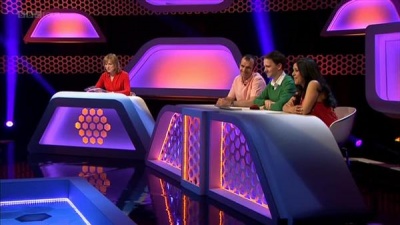 Should have stuck to Hive Minds, mate.
Should have stuck to Hive Minds, mate.
Two of the favourites for University Challenge met in the Elimination Round. One of them had to be eliminated, and a less worthy team will make the quarter-final in their stead. Bristol fell by the narrowest of margins, losing to Edinburgh by 185-175. The key moments came early in the game, Edinburgh raced to 50 from the first two sets, 80 from the first four. Bristol's buzzing was followed by some correct answers, the gap fell and eventually was overcome. The match came down to a one-question shootout, on the subject of trains, won by Edinburgh.
"I love quizzing," said Mastermind winner Rachael Neiman-Wiseman, who had taken Kate Bush as her specialist subject. A regular on the black chair show, Rachael won by three points from the nearest competitor. Ramblers overcame Godyn Family on Only Connect (2), scoring on all of their assigned questions (and three bonuses) to win by 33-13. Question of the night was on the Assassin's Creed video games: obvious to the cognoscenti, utterly impenetrable to the rest of us.
Television's biggest game show is back, I'm a Celebrity... Get Me Out of Here! returns (VM1 and ITV, from Sun). As one show starts, another finishes – it's the Bake Off final (C4, Tue), and Handmade follows (C4, Thu).
Your nostalgia quota is filled with new Gamesmaster (E4 online, Sun; television, Wed). We see Bidding Wars (C4, weekdays) and don't know if it's game. We see I Literally Just Told You listed in last week's TV Times, but the feature article is not in this week's edition. Next Saturday is crossover night: Strictly Come Dancing special on The Hit List, I'm a Celebrity special on The Chase Celebrity Edition.
Pictures: Remarkable (part of EndemolShine group), RDF Media, Gameface, Youngest Media, Possessed, Possessed / Potato, EBU / Thomas Hanses, Green Inc & Saltbeef.
To have Weaver's Week emailed to you on publication day, receive our exclusive TV roundup of the game shows in the week ahead, and chat to other ukgameshows.com readers, sign up to our Google Group.


